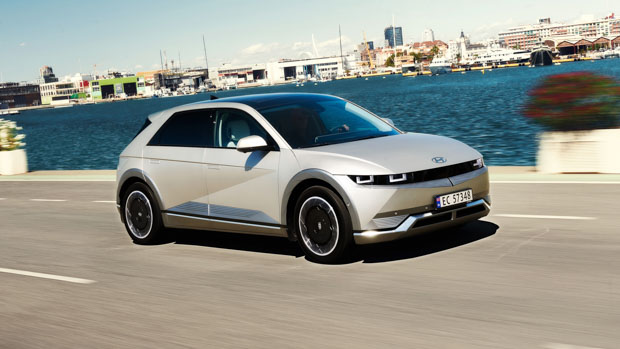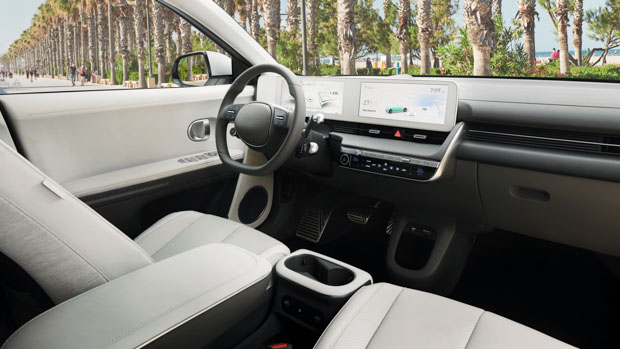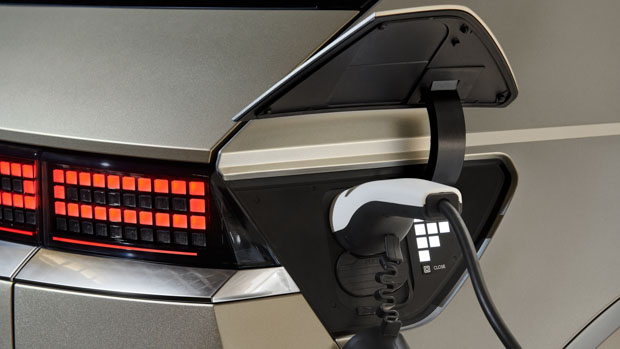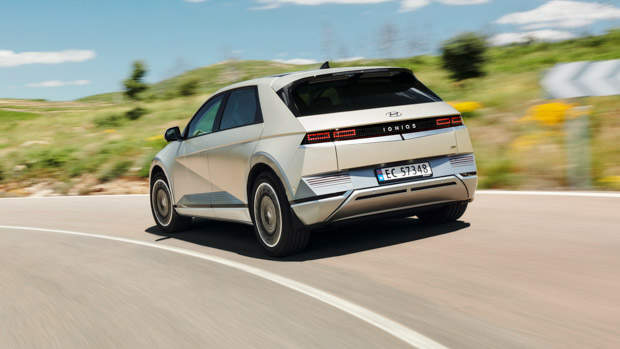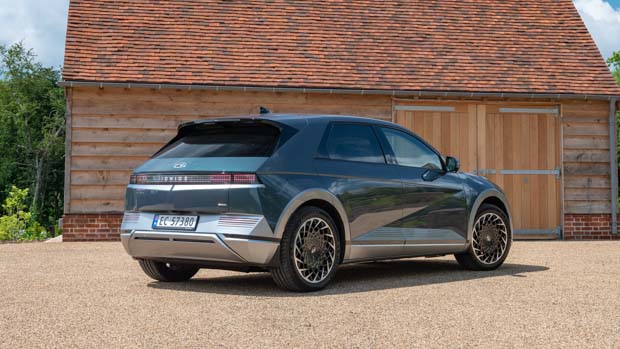-
Car Reviews
- Car News
-
Car Comparisons
Latest comparisons
- Chasing Deals
Hyundai has chosen to offer just one fully loaded ‘launch variant’ in its initial allocation of 400 cars for the Australian market before expanding range in 2022
In order to make the biggest splash with its new EV tour-de-force – the Ioniq 5 – Hyundai Motor Company Australia (HMCA) has decided to offer its high-tech show-stopper in a single ‘launch variant’ with a comprehensive specification and two drivetrain options, with the initial 400-strong allocation to be sold online.
The more affordable of the two (at $71,900 before on-road costs) features rear-wheel drive and a single 160kW electric motor on the rear axle, whereas the slightly more expensive all-wheel drive model (at $75,900 before on-road costs) features a 155kW electric motor on the rear axle and an additional 70kW electric motor on the front axle.
Both Ioniq 5 drivetrains also feature a 72.6kWh lithium-ion polymer battery, making them viable alternatives to the best-selling Tesla Model 3 sedan and forthcoming Model Y crossover.
With its single electric motor and 160kW/350Nm outputs, the rear-drive Ioniq 5 is good for a WLTP range of 451km, a 0-100km/h time of 7.4 seconds, and an 80-120km/h rolling acceleration time of 4.7 seconds.
The dual-motor Ioniq 5 all-wheel drive increases overall outputs to 225kW/605Nm, which slashes the 0-100km/h time to 5.2 seconds and reduces the 80-120km/h time to 3.8 seconds, though the AWD does lose a bit of range – 430km according to WLTP measurements (21km less).
At 19.0kWh/100km, the AWD uses more energy than the rear-drive model (17.9kWh/100km), though both achieve the same top speed of 185km/h.
Hyundai claims the Ioniq 5 offers “world first patented charging technology”, with ultra-fast 400-volt and 800-volt charging capability, plus a ‘Vehicle-to-Load’ (V2L) function that allows owners to charge electric devices (such as scooters, bicycles and camping equipment) from the Ioniq 5’s charge port, which can supply up to 3.6kW of power.
On an ultra-fast 350kW DC charger, the Ioniq 5 takes just over 17 minutes to go from 10- to 80-percent charge, while a five-minute ultra-fast charge can boost range by 100km.
A standard AC charge takes just over six hours, whereas a 50kW DC charge takes 56 minutes for the rear-drive model and 61 minutes for the AWD.
Aside from competitive EV performance and range, and very progressive vehicle design, the Ioniq 5 launch model offers a wealth of standard equipment.
The only option is a matte paint finish for $1000.
Among many highlights, the launch Ioniq 5 features 20-inch alloy wheels, LED head- and tail-lights with ‘Parametric Pixel’ lighting signatures, an acoustic windscreen and side door glass, rear privacy glass, a full glass roof with electric sunshade, power door handles (that sink flush into the body sides when not being used), a power tailgate and keyless entry/start.
Exterior colours include Atlas White, Galactic Grey metallic, Phantom Black mica, Digital Teal-Green mica, Lucid Blue mica and Gravity Gold matte.
Inside, there’s a 12.3-inch instrument cluster, 12-way heated/cooled electric ‘Relaxion’ front seats with electric lumbar and memory, two-way electric rear seats with heating, a heated steering wheel, rear door sunshades, ambient lighting, remote start and smart parking assistant, dual-zone climate control and a 12.3-inch multimedia navigation system with Apple CarPlay/Android Auto and eight premium Bose speakers.
With a completely flat floor and a vast 3000mm wheelbase sitting atop Hyundai’s e-GMP platform, the Ioniq 5 offers loads of cabin space, complemented by a sliding ‘universal island’ centre console that can be moved fore-aft by up to 140mm.
The electric front seats are around 30 percent slimmer than conventional seats, while recycled PET bottles, plant-based and natural wool yarns, and bio paint with plant extracts are used in the construction of the seats, headlining, door trims, carpet and armrests.
The Ioniq 5 features seven airbags (including a centre-front airbag), AEB with pedestrian and cyclist detection, as well as collision-avoidance assistance for junction turning and crossing, lane-changing, blind-spot, oncoming traffic, and side evasive assist that provides steering assistance.
There’s also a blind-spot view monitor, driver attention warning, lead-vehicle departure alert, auto high-beam, speed-limit assistance, lane-following and lane-holding assistance, reversing AEB and cross-traffic collision avoidance, rear occupant alert, safe-exit assistance, adaptive cruise control with stop and go, and a 3D surround-view monitor with front and rear parking sensors.
Latest news
About Chasing cars
Chasing Cars reviews are 100% independent.
Because we are powered by Budget Direct Insurance, we don’t receive advertising or sales revenue from car manufacturers.
We’re truly independent – giving you Australia’s best car reviews.
